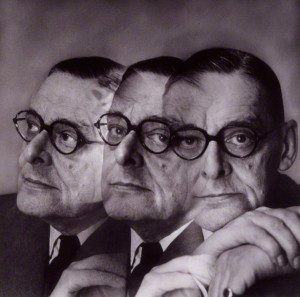…I said to my soul, be still, and wait without hope
For hope would be hope for the wrong thing; wait without love
For love would be love of the wrong thing; there is yet faith
But the faith and the love and the hope are all in the waiting.
Wait without thought, for you are not ready for thought:
So the darkness shall be the light, and the stillness the dancing.
East Corker III
Thomas Stearns Eliot was born on this day in 1888.
He was an important influence on my early spiritual thinking. His poetry, particularly the Four Quartets and his plays, particularly Murder in the Cathedral and the Cocktail Party each marked me deeply.
I find T. S. Eliot’s religious path utterly fascinating, moving from his Unitarian heritage, his grandfather was the founding minister of the First Unitarian Church of St Louis, as well as Washington University, to British subject (no doubt a part of the whole of his spirituality, and with that) to Anglo-Catholicism. This alone totally delicious. Although for me actually the most intriguing thing is the direct influence of Buddhism on his thought.
He encompassed within his life the three spiritual traditions I am most touched by, Anglicanism (as I’m fond of saying, my favorite Christians), Unitarianism, I cannot say how much I owe to the current of rational religion for allowing me to flower fully, and, of course, Buddhism, which has given my spiritual life its contours and direction.
It appears that fully a third of Eliot’s coursework while doing graduate studies at Harvard were dedicated to Asian philosophy and philology, including first Sanskrit and then Pali. His interests included both Hinduism and Buddhism. But, as evidenced by his shifting from Sanskrit to Pali, his focus eventually settled on Buddhism. Much has been made of the possible influence on the course of his thinking from a class he took with Masaharu Anesaki on the Buddhist schools of Japan, focusing on the Madhyamika influence among Japanese sects and particularly interpretations of the great Indian Buddhist thinker Nagarjuna. Discussing this period of his life his friend and fellow poet Stephen Spender has famously declared Eliot “almost became a Buddhist.”
While his influences are many, I’ve found one allusion to his admiration for the Anthroposophist Rudolf Steiner, for instance, many people, including me, find distinctly Buddhist themes throughout his writings, marked, always, of course, with his own and nearly unique Unitarian marinated Anglo-Catholic sensibilities.
Much has been made in particular of Buddhist themes to be discerned within the Four Quartets.
Indeed…
We shall not cease from exploration
And the end of all our exploring
Will be to arrive where we started
And know the place for the first time
…
Quick now, here, now, always –
A condition of complete simplicity
(Costing not less than everything)
And all shall be well and
All manner of thing shall be well
When the tongues of flame are in-folded
Into a crowned knot of fire
And the fire and the rose are one
Little Gidding V













